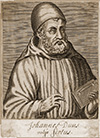- Edition Information
- Ordinatio. Prologue.
- Ordinatio. Book 1. Distinctions 1 and 2.
- Ordinatio. Book 1. Distinction 3.
- Ordinatio. Book 1. Distinctions 4 to 10.
- Ordinatio. Book 1. Distinctions 11 to 25.
- Ordinatio. Book 1. Distinctions 26 to 48.
- Ordinatio. Book 2. Distinctions 1 - 3.
- Ordinatio. Book 2. Distinctions 4 to 44.
- Ordinatio. Book 3. Distinctions 1 - 17.
- Ordinatio. Book 3. Distinctions 26 - 40.
- Ordinatio. Book 4. Distinctions 1 - 7
- Ordinatio. Book 4. Distinctions 8 - 13.
- Ordinatio. Book 4. Distinctions 14 - 42.
- Ordinatio. Book 4. Distinctions 43 - 49.
 The Ordinatio of John Duns Scotus  Ordinatio. Book 2. Distinctions 1 - 3. |
© Copyright 1989-2024 InteLex. All Rights Reserved.
InteLex, NLX and PAST MASTERS are trademarks of InteLex Corporation.